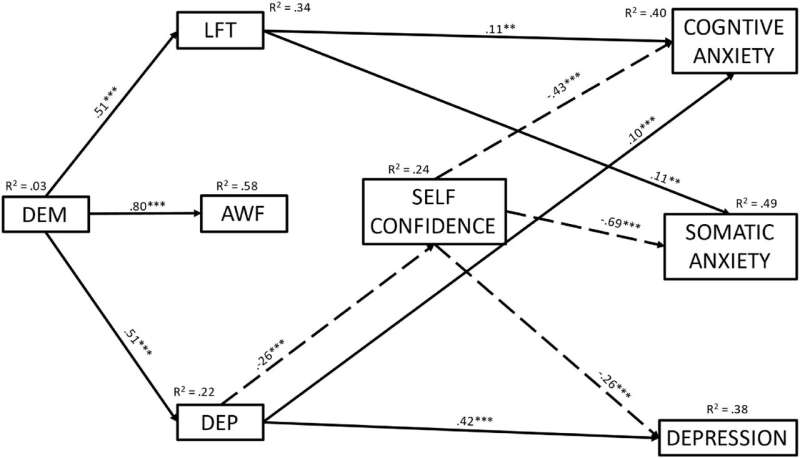This article has been reviewed according to Science X's editorial process and policies. Editors have highlighted the following attributes while ensuring the content's credibility:
fact-checked
proofread
Study reveals warning signs of poor mental health in athletes

'Put down' language is a key indicator of poor mental health in athletes, recent research shows.
More than 400 athletes across a variety of sports, ages and levels of experience were questioned for the study by sports psychology experts from Staffordshire University and Manchester Metropolitan University.
The findings reveal that athletes' belief systems—specifically irrational beliefs—are related to poorer self-confidence, and in turn, greater competitive anxiety and depressive symptoms.
Phrases that reflect self-depreciating beliefs such as "if I lose, I'm a failure" or "If I face setbacks, it shows how stupid I am" are warning signs, say the authors.
Paul Mansell, Lecturer in Sport and Exercise Psychology at Staffordshire University, said: "Despite the psychological benefits of physical activity, studies frequently report poor mental health in athletes, which may be exacerbated by adversities, such as injury, de-selection, and performance pressure.
"We investigated athletes' beliefs, how they view stress, their levels of self-confidence and put all this data together to work out what might predict psychological well-being. We found irrational beliefs to be a core reason for symptoms of poor mental health manifesting in athletes."
This is the first known study that has examined irrational beliefs, self-confidence, and the psychological well-being of athletes all together. Irrational beliefs are extreme, rigid, and illogical ideas that people hold. For example, a person might believe that they "must" get what they want, or that just because they have failed, that they are a "complete failure".
Dr. Martin Turner, from Manchester Metropolitan University, said: "In our recent study, self-depreciation beliefs were found to be the main predictor of low self-confidence. In simple terms, when an athlete put themselves down and uses language like "If I lose, it means I am a failure" it is most damaging and most likely to lead to losses of confidence. This is then likely to have a knock-on effect on performance and well-being.
"We can all work to help athletes develop mindsets that help them deal with the challenges of sport and life. By encouraging rational and logical beliefs about performance, we can help athletes to stay healthy amidst the high demands of competitive sport."
The authors propose Rational Emotive Behavior Therapy (REBT) as an effective tool for protecting self-confidence. REBT helps athletes to challenge these self-depreciation beliefs and develop beliefs that are more helpful and healthy. For example, rather than believe "I am a failure if I fail", this might be countered with "failing is not ideal, but it does not mean that I am failure".
Paul added, "The good news is that irrational beliefs can be challenged and weakened. A coach, teammate or a sports psychologist can listen out for irrational belief phrases and help athletes to counter them. Promoting helpful 'self-talk' or imagery can really help to shift somebody's mindset from being rigid and illogical to being more rational, flexible and healthy."
The work is published in the journal Psychology of Sport and Exercise.
More information: Paul C. Mansell et al, Testing the REBT-I model in athletes: Investigating the role of self-confidence between irrational beliefs and psychological distress, Psychology of Sport and Exercise (2022). DOI: 10.1016/j.psychsport.2022.102284




















